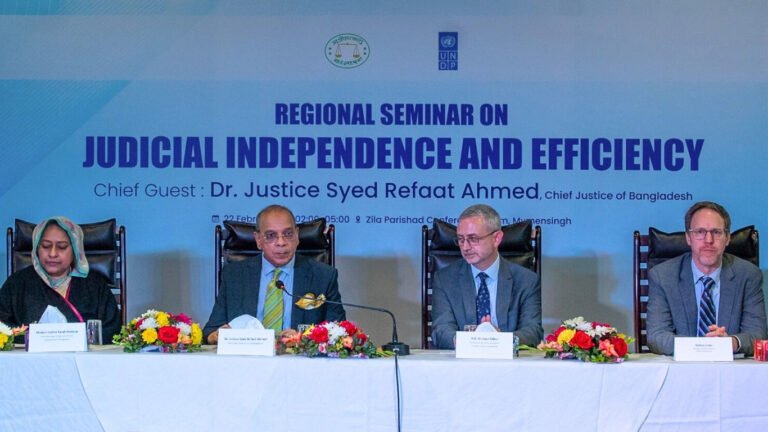Chief Justice of Bangladesh, Syed Refaat Ahmed, highlighted the judiciary’s ongoing efforts to strengthen its independence, accountability, and efficiency. He emphasized the commitment to a comprehensive reform roadmap, which has garnered increasing support from legal experts, development partners, and the public. He urged judges to play an active role in the reform process, ensuring lasting changes to safeguard judicial independence, integrity, and improved access to justice.
Speaking at a regional seminar in Mymensingh on Saturday, he mentioned how the student-led revolution of July and August 2024 ignited a collective will to end oppression and restore justice and equality. Building on this spirit, he unveiled a comprehensive Judicial Reform Roadmap on 21 September 2024, which aims to enhance the judiciary’s ability to serve with integrity and efficiency.
The Chief Justice shared that significant steps have already been taken towards achieving a true separation of powers and ensuring judicial independence. He pointed to the establishment of the Judicial Appointment Council and the Supreme Judicial Council—autonomous bodies within the Supreme Court—tasked with overseeing the recruitment and removal of judges, free from executive interference.
Additionally, Justice Ahmed announced plans to create a separate Secretariat for the Judiciary, further ensuring administrative autonomy. He also proposed new Posting and Transfer Guidelines for district judiciaries, aimed at promoting consistency and fairness in judicial appointments.
He emphasized that in just the past six months, the Supreme Court has gained greater powers to recruit, discipline, and remove judges, marking a significant shift in the judiciary’s role. These measures, he believes, are key steps toward formally separating the judiciary from the executive and legislature, with the ultimate goal of granting the Supreme Court full authority over judicial administration.
The Chief Justice reiterated that his mission is to establish a judiciary that truly serves the people, a goal that can only be achieved through policies developed and implemented by a fully independent judiciary.
Ambassador Michael Miller, Head of the EU Delegation to Bangladesh, attended as a special guest, along with Justice Farah Mahbub of the High Court Division. Stefan Liller, UNDP Bangladesh’s Resident Representative, welcomed attendees and reaffirmed UNDP’s commitment to strengthening the justice system. Liller emphasized the importance of a people-centered approach to justice reforms, focusing on ensuring access to justice for all, particularly marginalized communities.
Ambassador Miller also underscored the importance of an independent judiciary for fair justice, highlighting the European Union’s support for judicial reforms in Bangladesh and the creation of a judicial self-administration secretariat. He also stressed the significance of village courts in providing a semi-formal dispute resolution system for marginalized populations.



